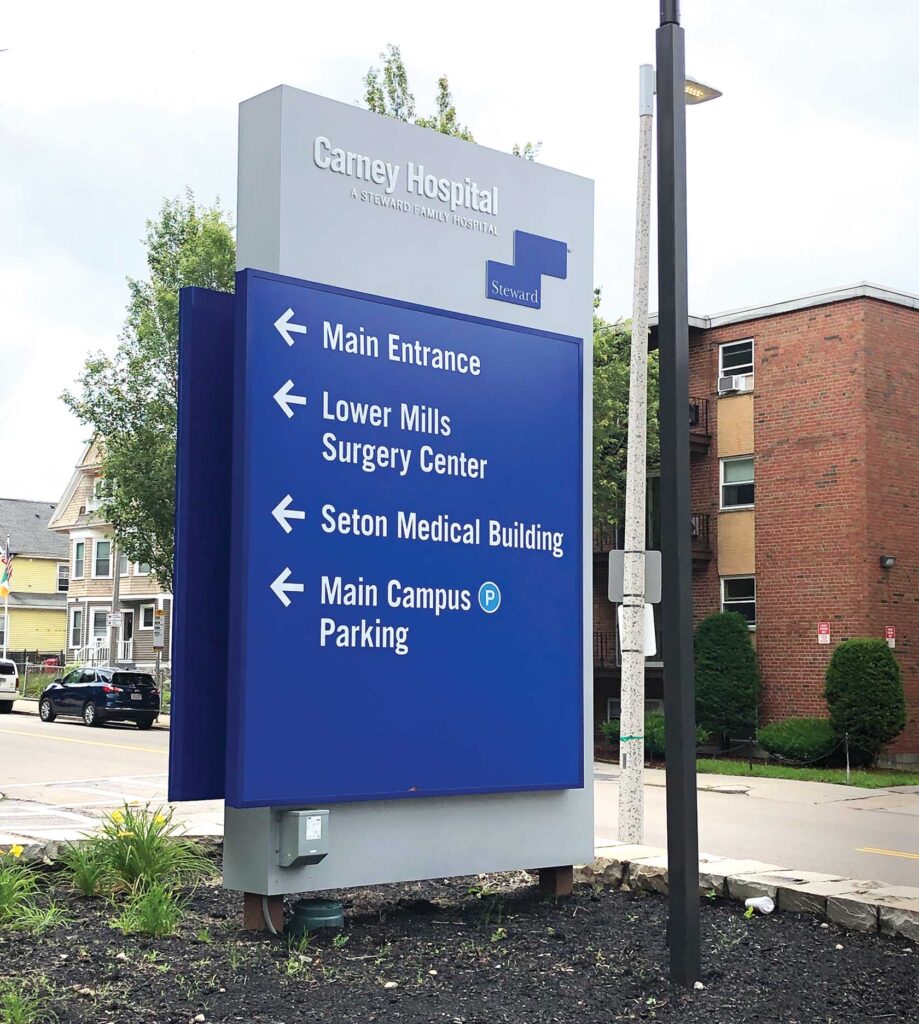‘We need Carney to be a hospital again’
Neighbors share frustrations and solutions with working group

Gathered at the Sheet Metal Workers Local 17 training center in Dorchester, health care workers and community members voiced their concerns about the abrupt closure of Carney Hospital and offered solutions for what could come next for the shuttered facility during a neighborhood listening session last Thursday.
Boston’s Commissioner of Public Health, Dr. Bisola Ojikutu, and president and CEO of the Massachusetts League of Community Health Centers, Michael Curry, who co-chaired the working group appointed to provide recommendations for what the city should do in the wake of Carney’s closure, led the meeting.
“I know that there’s still a lot of anger and feelings associated with [the] closure. Certainly, a lot of people lost jobs and lost access to services. I want to tell you that as a doctor, as a Dorchester resident … I share your anger,” Ojikutu said. “But what I encourage us to do this evening is to really focus in on the future and what we need to do to meet the community’s health needs now.”
Boston City Councilor John FitzGerald echoed Ojikutu’s message of moving forward.
“We know the past of what has happened here, and what we really want to focus on is the solutions,” FitzGerald said, adding that “when we think about the renewal of this place, we want to make sure that it’s addressing the needs of the community.”
Community members took turns sharing a mix of sadness and optimism over the future of health care in neighborhoods like Dorchester and Mattapan, proposing ways to improve health care outcomes.
Among the suggestions were that health officials investigate other medical institutions in Massachusetts that reopened after closing. Several community members also expressed the need for urgent care while some called for centralized and wraparound multilingual services, lab diagnostics and culturally sensitive care.
Ellen MacInnis, speaking on behalf of the Massachusetts Nurses Association, said Carney’s closure was a “loss of a pivotal economic engine” that provided good jobs, and its “ripple effects continue to reverberate across communities, neighborhoods, and families,” particularly for those who now have to travel longer distances to access care.
MacInnis reiterated the need for urgent care in the neighborhood and for a “fully functioning hospital.”
Valerie Burton, who worked at Carney for 21 years, said the hospital served more than just its immediate community.
“People came from near and far … and we took care of them,” she said, adding that the building was a “sanctuary” for many.
Now, patients, including Burton herself, may have to face longer wait times to receive treatment.
When Carney closed on Aug. 31 after its parent company, Steward Health Care, filed for bankruptcy, it left Boston’s most populous neighborhood without the necessary medical services, burdening an already underserved community facing significant health disparities.
In 2023, the Department of Public Health released its “Advancing Health Equity in Massachusetts” report, highlighting significant racial inequities in the state’s healthcare industry.
Data from the report showed that Black, Hispanic and Native American people in the state face significant healthcare challenges. From 2011 to 2020, maternal morbidity nearly doubled, with the rate increasing by 10.1 percent year over year among Black birth givers. In 2020, the rate of severe maternal morbidity among Black people was 191.0 per 10,000 births, the highest across demographics and more than double that of their white counterparts.
The disparities go beyond childbirth. Infant mortality rates were highest among Black children from 2000 to 2020, and Black and Native American adults were more likely to die prematurely due to cardiometabolic diseases in 2021.
Dorchester, Roxbury and Mattapan, areas with high concentrations of Black and Hispanic populations, are among the Massachusetts neighborhoods highlighted in the report as facing the greatest health inequities, a reality Carney’s closure illuminated and, according to some, exacerbated.
In September, Gov. Maura Healey and Mayor Michelle Wu appointed the working group to take charge of providing recommendations for the future of healthcare in the neighborhoods surrounding Carney. The 34-member group, composed of healthcare experts, elected officials and community advocates, has met several times since October and is set to issue its assessments in early 2025.
Ojikutu said last Tuesday’s listening session was “a critical step in this process” and would inform the working group’s recommendations after what will be a “complicated and time-intensive process” to meet the needs of “vulnerable” patients.
“The loss of a hospital where some residents receive care as well as gained significant access to key social services is obviously deeply concerning to all of us,” Ojikutu said.
The working group’s recommendations will address the issues that “existed before Carney [and] while Carney was operational, and it’s probably getting worse now,” she said. “So this is a deeper issue, and I think we want to really dig in and be holistic and be comprehensive about how we’re thinking about health service delivery in this area.”
Susan Coffey, formerly a nurse at Carney, said even before its closure the hospital lacked the services patients needed, adding that it wasn’t because of the nurses or doctors; “it was Steward.”
Like other community members, she also emphasized the void the facility’s closure created.
“We need Carney to be a hospital again,” she said.






